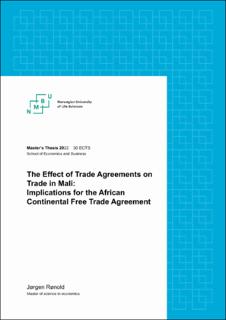The effect of trade agreements on trade in Mali : implications for the African Continental Free Trade Agreement
| dc.contributor.advisor | Garcia, Roberto Javier | |
| dc.contributor.author | Rønold, Jørgen | |
| dc.coverage.spatial | Mali | en_US |
| dc.date.accessioned | 2022-06-30T10:12:10Z | |
| dc.date.available | 2022-06-30T10:12:10Z | |
| dc.date.issued | 2022 | |
| dc.identifier.uri | https://hdl.handle.net/11250/3001744 | |
| dc.description.abstract | In 2018, the African Continental Free Trade Agreement (AfCFTA) was formed. It is the largest free trade agreement (FTA) formed since the WTO’s founding in 1995, and is projected to increase trade within Africa by more than 50 percent according to the UN (Luke, 2019). This thesis is interested in how the AfCFTA may affect trade in Mali, a weak African economy with some of the worst preconditions for economic activity and trade on the continent. | en_US |
| dc.language.iso | eng | en_US |
| dc.publisher | Norwegian University of Life Sciences, Ås | en_US |
| dc.rights | Attribution-NonCommercial-NoDerivatives 4.0 Internasjonal | * |
| dc.rights.uri | http://creativecommons.org/licenses/by-nc-nd/4.0/deed.no | * |
| dc.subject | Economic integration | en_US |
| dc.subject | International trade | en_US |
| dc.subject | African Continental Free Trade Agreement | en_US |
| dc.subject | Free trade agreements | en_US |
| dc.subject | AfCFTA | en_US |
| dc.title | The effect of trade agreements on trade in Mali : implications for the African Continental Free Trade Agreement | en_US |
| dc.type | Master thesis | en_US |
| dc.description.localcode | M-ECON | en_US |
Tilhørende fil(er)
Denne innførselen finnes i følgende samling(er)
-
Master's theses (HH) [1071]

